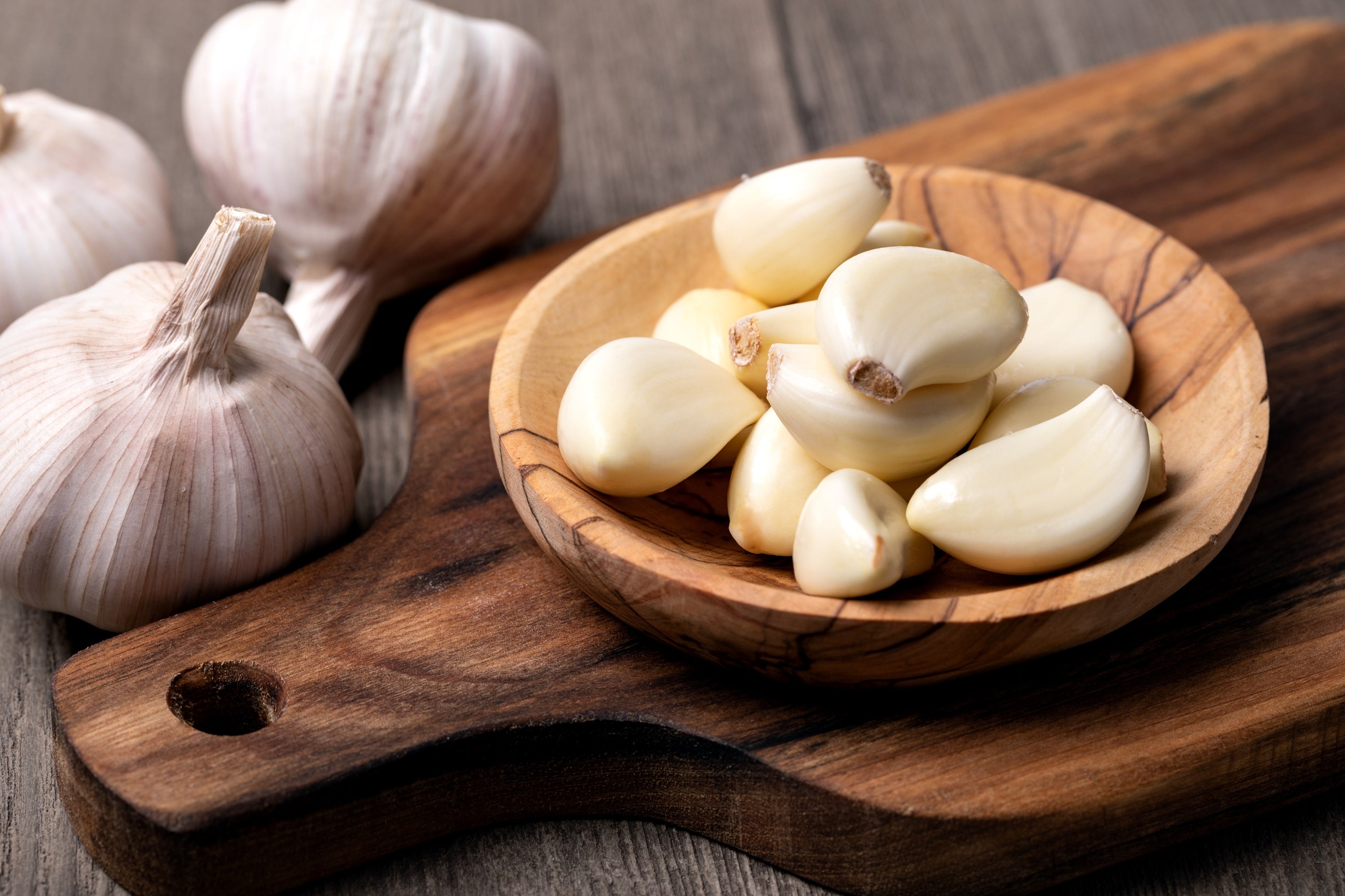Jump to Section
Table of Contents
- What Is Onion Intolerance?
- Symptoms of Onion Intolerance
- Onion Intolerance is Different from an Onion Allergy
- Causes & Triggers of Onion Intolerance
- Diagnosis and Testing
- What Foods to Avoid if You Have an Onion Intolerance
- Onion Intolerance Diet
- FAQs
- Conclusion
Onion Intolerance
Written by:
 Riya Lakhani-Kanji, MSc, ANutr. Last Reviewed 6th January 2026.
Riya Lakhani-Kanji, MSc, ANutr. Last Reviewed 6th January 2026.
Have you ever enjoyed a meal, only to find yourself grappling with bloating and stomach cramps hours later? As you replay your meal choices, you might question: was it that rich sauce or the seemingly harmless healthy salad? Surprisingly, the real culprit might just be an unsuspecting staple in your kitchen.
Onions can be a valuable part of a healthy, balanced diet. But they can also be a hidden source of digestive troubles for those with onion intolerance. Even a small amount can lead to delayed discomfort.
This article will guide you through the science behind onion sensitivity, help you decode your body's signals, and provide easy tips to keep flavour in your food while keeping discomfort at bay.

What Is Onion Intolerance?
Onion intolerance is a food sensitivity that makes it hard for some people to digest onions. Unlike an onion allergy, which is much rarer and can cause severe, even life-threatening reactions, onion intolerance typically results in milder digestive issues. While these symptoms may not be as severe, they can still be quite uncomfortable.
The main culprit behind onion intolerance is a type of carbohydrate called fructans, which are part of a group of fermentable carbohydrates known as FODMAPs (Fermentable Oligo-, Di-, Mono-saccharides and Polyols). These carbs are tricky for your body to absorb in the small intestine, so they pass into the large intestine. There, gut bacteria break them down, which can produce extra gas. This process often leads to that all too familiar bloating sensation, stomach pain, and gas.
It’s worth noting that onions are just one member of the Allium family, which includes garlic, shallots, scallions, and chives. If you find onions hard to digest, you might want to be cautious with these other options, too! They share similar compounds, like fructans, that can cause stomach discomfort. So, if you’re sensitive to onions, exploring these alternatives could lead to some surprising discoveries—but be mindful of how they make you feel!

What Are the Symptoms of Onion Intolerance?
The symptoms of onion intolerance can vary from person to person, but they often come down to digestive problems. When someone with this intolerance eats onions, they might feel bloated. This bloating is often accompanied by gas, leading to more frequent flatulence and an overall feeling of discomfort.
People with onion intolerance may also experience stomach pain or cramps, which can be anything from a mild twinge to quite intense. This discomfort results from certain sugars in onions that the body struggles to digest, causing gas to build up in the gut. Sometimes, individuals might even feel nauseous after eating onions.
Typically, symptoms appear within a few hours of eating onions, but they can sometimes take longer to show up. This unpredictability can make it tricky to pinpoint exactly what's causing your discomfort. Dealing with these digestive issues can really affect your daily life, leading to concerns about what to eat and making it tough to enjoy dishes that include onions. It’s understandable to feel frustrated, but with a little awareness and some creative substitutions, you can still enjoy your meals without the worry!
Still confused? You're not alone! Many people struggle to figure out what's causing their discomfort, whether it's onion intolerance or something else entirely. If you're looking for clarity, why not try a food intolerance test from Supply Life? It can help you accurately identify your triggers so you can take charge of your health. Learn more about our testing options.
How is Onion Intolerance Different from an Onion Allergy?
An onion allergy is a serious condition where your immune system mistakenly identifies proteins in onions as harmful. This mistaken reaction is driven by a specific antibody called IgE, which your body produces in response to allergens. When you consume onions, the IgE triggers an immediate immune reaction that can lead to symptoms like hives (itchy bumps), wheezing (trouble breathing), and swelling in various parts of your body. In rare cases, reactions can be more severe, such as anaphylaxis, which is life-threatening and requires immediate medical attention. Because of these potential dangers, people with an onion allergy must completely avoid onions and any products that contain them.
On the other hand, onion intolerance affects your digestive system instead of your immune system. If you have this sensitivity, you might experience symptoms like bloating, gas, or stomach pain, but these usually appear several hours after eating onions. This delayed reaction can make it harder to recognise that onions are the cause of your discomfort. The good news is that many people with onion intolerance can manage their symptoms by limiting onions to a level that works for them.
Causes & Triggers of Onion Intolerance
Onion intolerance can happen for a few different reasons. One major factor is a type of carbohydrate called fructans. Many people struggle to digest fructans, especially those with conditions like Irritable Bowel Syndrome (IBS) or sensitivities related to FODMAPs. For these individuals, eating onions might lead to uncomfortable digestive symptoms.
Beyond fructans, onions are rich in sulfur compounds that lend them their distinctive flavour and aroma. For some people who are sensitive to these compounds, onions can cause even more digestive issues, making it harder to eat them without discomfort.
Another important factor to consider is gut health. If your gut bacteria are out of balance or if your digestive system is more sensitive than usual, you might experience a stronger reaction to onions. While not everyone has problems with onions, how your body reacts can often depend on the overall state of your gut.
Lastly, how someone reacts to other members of the allium family, like garlic, leeks, and shallots, can provide important clues. If you have sensitivities to these foods, it might suggest that you could also be more sensitive to similar compounds found in onions.

Diagnosis and Testing
Figuring out whether you have an onion intolerance is an important step in taking charge of your digestive health. A clear plan can help you understand your symptoms and identify any food triggers. Here are some things you can try:
Try an Elimination Diet
One of the simplest ways to check for food sensitivities is by trying an elimination diet. Start by cutting out onions and their close relatives, like garlic, leeks, and shallots, for about four to six weeks. During this time, pay attention to how your body feels and any changes in your symptoms. After the elimination period, slowly reintroduce onions in small amounts to see if any discomfort pops up again. This straightforward process can help you figure out if onions are causing your digestive issues.
Ruling Out an Allergy
If you think you might have an onion allergy instead of just an intolerance, it’s important to get professional testing. Food allergies can trigger your immune system and sometimes lead to serious reactions, so it’s best to be cautious. Seeing an allergist can provide clarity through tests like IgE skin prick tests or blood tests. These tests will check how sensitive your body is to specific allergens, giving you a better idea of whether onions could be causing an allergic reaction.
Intolerance Testing
Alongside dietary changes, at-home food intolerance tests can give you great insights into how your body handles different foods. Our at-home testing kit can examine your sensitivity to at least 64 different foods, including onions. Unlike allergy tests that focus on immune responses, these tests can help you figure out if onions are a potential cause of your digestive discomfort. Knowing this can be a game-changer in managing your symptoms and enjoying your meals again!

Unlock your full potential today
Get your easy to use food intolerance test today
What Foods to Avoid if You Have an Onion Intolerance
Navigating food with an onion intolerance can be tricky, but understanding what to avoid can help limit digestive discomfort. Here are some foods that may contain onions or trigger sensitivity:
- Raw and Cooked Onions: Both raw and cooked onions are common in many dishes, including salads, soups, and savoury meals. It’s best to limit these to avoid discomfort.
- Pre-Packaged Meals: Many frozen dinners and ready-to-eat curries often have onions as a main ingredient, so it’s a good idea to check the labels carefully.
- Sauces and Condiments: Some sauces, like ketchup, salsa, BBQ sauce, curry pastes, pizza sauce and gravies, often use onions for added flavour. Make sure to look at the ingredients to see if they contain onions.
- Soups and Broths: Both homemade and store-bought soups, stocks, and broths may include onions for extra depth of flavour, so be cautious when choosing these.
- Snacks and Crisps: Certain chips and snacks may have onion-derived flavourings in their seasoning.
- Seasoning Mixes: Many store-bought spice and seasoning blends commonly have onion or garlic powder in them. It’s wise to read labels to avoid any hidden onions.
- Salad Dressings: Many salad dressings, especially creamy or vinaigrette types, can contain onion as a flavour enhancer. Checking the ingredients can help you make safer choices.
Remember, it’s always a good idea to keep a close eye on food labels! Occasionally, onion may be listed under the broad term “spices.” This can happen when it makes up less than 2% of the product's weight and isn’t among the top allergens. While onions are vegetables, their powdered versions are classified as spices. If you see “spices” on a label and you’re unsure, reaching out to the manufacturer for clarification on the ingredients can help you navigate your choices and keep your meals hassle-free.

Onion Intolerance Diet
Managing an onion intolerance means more than just skipping the onion; it's about getting creative in the kitchen! You can absolutely keep the flavours you love while avoiding those uncomfortable symptoms. If onions have been a go-to in your cooking, a low-FODMAP strategy for replacement can make this transition smoother and more enjoyable.
Consider using vegetable-based substitutes like celery and bell peppers when you're cooking. These options add great texture and a hint of sweetness, making them versatile enough for many recipes. You can also use the green tops of leeks as a mild alternative; they offer a subtle onion-like flavour while still being low in FODMAPs. A pinch of asafoetida (hing) or a dash of smoked paprika can also enhance the taste and work wonders in your cooking!
You can even explore the world of umami flavours! Adding ingredients like tamari or miso paste can provide that rich depth you usually get from onions in soups, stews, and sauces.
Here’s a helpful tip: try using garlic or onion-infused oils. Since fructans in onions dissolve in water and not in oil, these infused oils can give you the pleasant scent and taste you’re looking for without upsetting your stomach. You can drizzle them over finished dishes or use them to sauté your favourite vegetables for an extra flavour boost!
Remember, everyone’s body reacts differently, so keep an eye on how you feel with different substitutions.

Expert Insights
"Living with an onion intolerance might not be as well-known as other food intolerances, but it can truly impact your daily life. The good news is that you can take a food intolerance test with Supply Life to pinpoint your specific triggers. By learning what foods work for you and making mindful choices, you can find freedom from discomfort! "— Riya Lakhani-Kanji BSc, MSc
Conclusion
Understanding onion intolerance is an important step in taking control of your dietary health! If you've experienced symptoms like bloating, gas, or stomach pain after eating onions, you're certainly not alone. These uncomfortable symptoms often appear a few hours after you eat, which can make it hard to pinpoint onions as the cause.
Diagnosing onion intolerance typically involves keeping a food diary, testing for an intolerance, or consulting with a healthcare professional to identify what triggers your discomfort. The good news? Onion intolerance is manageable! You don't have to eliminate onions from your diet completely. Many people find that simply reducing their intake or using substitutes works wonders.
You don’t have to navigate this journey by yourself. Why not think about getting a food intolerance test from Supply Life? It might reveal some sensitivities you didn’t even know you had, allowing you to customise your diet even more effectively. With the right information, you’ll feel better equipped to manage your symptoms and make choices that truly work for you.

Unlock your full potential today
Get your easy to use food intolerance test today
FAQs
Why does onion upset my stomach?
Onions can cause stomach upset mainly because they are high in fructans, a type of carbohydrate that can be difficult for some people to digest. When fructans reach the large intestine, they can ferment and lead to symptoms such as gas, bloating, and discomfort. In addition to fructans, onions also contain sulfites, which can trigger reactions in individuals who are sensitive to them.
Can I be intolerant to onions but not garlic (or vice versa)?
Yes, it is possible to be intolerant to onions but not garlic, or the other way around. However, since both onions and garlic contain fructans, if you're intolerant to one, there's a higher chance that you might also be sensitive to the other. Everyone's digestive system works differently, so it's important to note how each food affects you personally. Tracking your reactions can help you understand your own sensitivities better.
What foods contain hidden onion?
You might be surprised to learn that hidden onions can be found in a variety of processed and packaged foods! Some common culprits are barbecue sauces, salad dressings, marinades, soups, and broths. Even snacks like chips and dips can sneak in onion powder or seasoning blends with onion. If you have an intolerance, it’s really important to check the ingredient labels closely to catch any hidden sources of onion.
What can I use as a substitute for onions in recipes?
Try using vegetables like celery, bell peppers, or fennel to bring depth and texture to your dishes. Just a small pinch of asafetida can also be a great substitute, especially in savoury recipes, as it gives off an onion-like aroma. For that rich umami flavour that onions usually provide, consider adding mushroom powder or nutritional yeast. These options can really elevate your meals while keeping them onion-free!
How do I know if I have an onion intolerance? Is there a test for it?
Figuring out if you're intolerant to onions can be tricky. Many people experience symptoms like bloating or stomach pain a few hours after eating onions. To find out if onions are causing these issues, you might want to try an elimination diet, where you stop eating onions for a while and see if your symptoms improve. However, for a clearer answer, you can take a food intolerance test. This test will show how your body specifically reacts to onions, making it easier for you to manage your diet.
Can an onion intolerance develop later in life?
Onion intolerance, like other food intolerances, can develop as you get older. Factors like changes in gut health, what you eat, or even stress can affect how your body digests foods such as onions. If you notice any symptoms after eating onions, it might be a good idea to look into whether you have an intolerance.
Will cooking onions change how my body reacts to them?
Yes, cooking can change how your body processes onions. Boiling onions can reduce the fructan content since these compounds leach into the cooking liquid. This means that cooked onions might be easier to digest for those with onion intolerance. However, everyone’s digestion is unique, so it's a good idea to try different cooking methods and see what works best for you.
Can an onion intolerance go away over time?
Onion intolerance can sometimes get better over time, especially if you work on the root causes, like improving gut health or managing symptoms of IBS. While there's no guaranteed cure, following a personalised diet, cutting back on onions, and talking to a professional may help you gradually increase your tolerance. Keep in mind that everyone experiences food intolerances differently, so it’s important to be patient and keep track of how you feel.
Are there any treatments or supplements that can help with onion intolerance?
While there isn't a specific treatment or supplement for onion intolerance, many people find relief by focusing on their gut health. Taking probiotics and digestive enzymes can support digestion, and sticking to a low-FODMAP diet may help reduce discomfort.
How is Onion Intolerance Different from Garlic Intolerance?
While both belong to the Allium family, they can impact our bodies in different ways. Onion intolerance typically stems from fructans and sulfites found in onions.
Garlic intolerance, on the other hand, is mainly triggered by fructans, and it can be far more intense! Garlic is one of the richest sources of fructans, especially when dried. In fact, dried garlic can contain nearly three times the amount of fructans found in fresh garlic. This higher level makes garlic a more common cause of digestive troubles for those who are sensitive. So, while both onions and garlic can pose challenges, garlic tends to be the stronger offender when it comes to digestive discomfort.

Written by: Riya Lakhani-Kanji, MSc, ANutr
Riya is a certified nutritionist with a passion for plant-based nutrition. Holding both a bachelor's and a master’s degree in nutrition, she skillfully blends her expertise with her writing to create insightful and engaging content focused on health and wellness.
Sources
All about onion, garlic and infused oils on the Low FODMAP Diet. (2023). https://monashfodmap.com/blog/all-about-onion-garlic-and-infused-oils-on-the-low-fodmap-diet/
Am I allergic to onions? (2024). https://www.healthline.com/health/onion-allergy
Could you have a fructan intolerance? (2023). https://health.clevelandclinic.org/fructans
Food processing and FODMAPs - what you need to know. (2017). https://www.monashfodmap.com/blog/food-processing-and-fodmaps-what-you/
High FODMAP food list. (2022). https://www.healthline.com/nutrition/foods-high-in-fodmaps
How to do an elimination diet and why. (2024). https://www.healthline.com/nutrition/elimination-diet
Onion allergy. (n.d.). https://www.nyallergy.com/onion-allergy/
Onion and garlic allergy. (2023). https://www.anaphylaxis.org.uk/fact-sheet/onion-and-garlic-allergy/
The comparison of the contents of sugar, amadori, and heyns compounds in fresh and black garlic. Journal of Food Science. (2016). https://ift.onlinelibrary.wiley.com/doi/abs/10.1111/1750-3841.13365
The 8 most common food intolerances. (2023). https://www.healthline.com/nutrition/common-food-intolerances
What to know about an onion allergy. (2020). https://www.medicalnewstoday.com/articles/onion-allergy#symptoms




